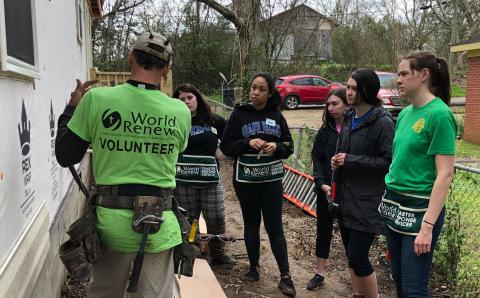Joshua Benton, a pastor, placed a stuffed elephant in the middle of his church’s council room. It was fall 2016, and the elders and deacons walking in the door were about to hear the reality of the church’s finances. Something would have to change for the tight-knit community of Friendship Chapel, and it would have to change soon.
An elephant—a metaphor for a looming problem no one wants to talk about—is in the room for many, many churches. The president of Barna Group, an American research and survey firm, predicts one in five churches in America will close within 18 months. A Montreal Gazette op-ed suggested two-fifths of Canadian churches might soon close. The projections are based on a drop in financial giving and the dwindling confidence of pastors that their churches will recover after COVID-19 restrictions are lifted.
Amy Schenkel of Resonate Global Mission, the Christian Reformed Church’s domestic and international mission agency, doesn’t see the financial lag being as big a problem for the Christian Reformed Church as it is for other denominations. Instead, what plagues congregations in our denomination, she said, is unresolved conflict augmented by the pressures of COVID-19.
“I think COVID has been a magnifying glass in our churches” exposing what is good and bad, Schenkel said. Churches can no longer ignore problem areas.
But it’s still a good time to ask: what happens when a church closes, and how can congregations navigate uncertainty before they get to that point?
The Process of Closing a Church
There are procedures within the CRC for when a church decides to close: approval from its classis (a regional assembly of churches), transferring members and ministerial credentials, legal dissolution, and more. But closing a church is much more than procedural.
“No one is prepared as a pastor for the process of closing,” Benton said. His church, Friendship Chapel in Jenison, Mich., decided to close in February 2017. “They never bring someone into seminary and say, ‘Here’s a church planter whose church closed after five years.’”
Schenkel agrees the CRC had few resources to offer churches facing closure, and the most recent guide was almost 20 years old. That’s why Resonate and the CRC’s Pastor Church Resources teamed up to create “At a Crossroads,” a guide for churches discerning their future, published last summer.
“We wrote it because we felt like there was nothing like this,” Schenkel said. “There’s so much congregational discernment that has to happen. You don’t just wake up one day and decide to close your church! There’s a grief process.”
“At a Crossroads” is a five-stage conversation addressing discernment, grief, and hope. Closing a church (or reimagining your church) comes only after a significant amount of conversation and time. And even that final stage presents multiple possibilities, such as close and restart, close and bless the community through your building, close and sell the property to bless other ministries, or follow the Spirit in a new way.
Closure Makes Way for New Ministry
Jon Huizenga is a church planter whose congregation was blessed and strengthened by the closing of Pioneer CRC.
Pioneer met as a church for 60 years in Cedar Springs, Mich., a rural town north of Grand Rapids. As the congregation grew smaller in number and more elderly, they decided to close. They had a dream for a new ministry in Cedar Springs and donated its financial assets and 63 acres of property to Classis Grand Rapids North to give to a church plant.
On their way home from a May 2018 classis meeting, Huizenga’s wife, Sam, turned to him in the car and asked, “How would you like to plant that church in Cedar Springs?”
“It was an immediate sense of invitation from God and excitement for both of us,” Huizenga said. Pioneer closed Dec. 31, 2018, and Rise Up opened Jan. 1, 2019. River Rock Church, which Huizenga planted in 2000, became Rise Up’s mother church. Several Pioneer members joined Rise Up. “It helped me tremendously to say that I am beginning a new church following on the 60-year history of Pioneer CRC,” Huizenga said. “It gives me credibility in a small town.”
Six months into the church plant, Resonate’s Schenkel visited. “We walked into a huge variety of businesses (downtown), and everybody knew Jon, and Jon knew everybody—the real estate agent, this guy who owned a candle shop, the brewery. You could just see that the presence of Christ was walking in through all of these spaces. All of these relationships were starting to blossom, and the seeds that had been planted there so long ago in this church that decided to close were now sprouting.”
Grieving the Loss of the Old
New, sprouting life is exciting, but that life comes through death. And death, Benton reminds us, is hard.
“I’ve been on the bedside of many people who have died, and it’s the same feeling” when a church closes, Benton said. “But instead of having one person, you have a whole congregation.”
Though Friendship Chapel closed almost four years ago, Benton and his family still are grieving the loss. He hopes to return someday to ordained ministry, but after three years without another call in the CRC, Classis Georgetown in December granted Benton release from office (Church Order Article 14c) to pursue teaching high school English.
Caring for a Pastor Whose Church Has Closed
Mark Bennink pastored Twelfth Avenue CRC in Jenison, Mich., for nearly 11 years before the church closed in December 2018. He said it’s important for congregations to care for their pastors’ health and well-being especially during a time of closure or transition.
“I was grateful when my former church extended my severance package from six to nine months, realizing how long it can take for the call process in our current ministry context,” Bennink said.
Bennink and Benton both stay in touch with members of their former churches.
Benton said being part of a church closure can be a perceived stigma for pastors seeking a new ministry. “I had one church leadership team outright tell me, ‘We can’t trust your leadership skills; you had to close a church,’” he said. “I’ll be honest, that did hurt. I’ve learned since then that you have to have darn good leadership skills to close a church.”
Equipping Pastors for Hard Realities
It does take leadership to address the elephant in the room, to lead a congregation through difficult conversations, and to listen to the Spirit. What’s more, “our pastors are so worn out right now,” Schenkel said. “At a Crossroads” encourages congregations to find an outside facilitator for discernment conversations.
To pastors and congregations alike who are worried because of COVID-19, Benton says, “Don’t borrow trouble.” Be a family. Speak life to each other. New beginnings can come in unexpected ways and places, Huizenga says. And Bennink reminds us that birth and death are part of a local church’s life cycle and that the church’s impact reaches far beyond its institutional existence.
Conversations around closing a church are unique to each congregation. Even if churches are not facing closure, they must still die to personal preferences, opinions and outside pressures in order to listen to God and each other, Schenkel said. “Life still comes out of death—out of death comes life, that’s our theology.”
The Banner wants to continue writing about what happens when a church closes and what a church can do to prevent what seems like an inevitable closure. If your congregation has insights to share, please email news@thebanner.org with the subject line “When Churches Close.”
About the Author
Maia VanderMeer is a freelance news correspondent for The Banner. She lives in Mission, B.C.






